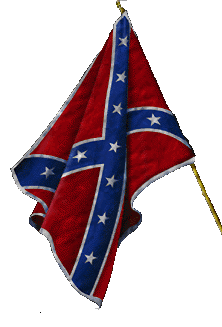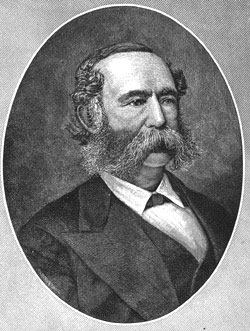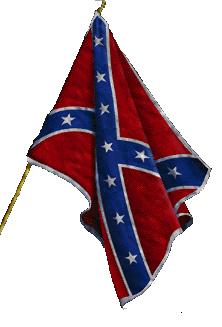| Back |
Wade Hampton III



"A Veritable God of War"
Throughout his lifetime, Wade Hampton III held a number of important offices and positions: planter, plantation owner, businessman, legislator, community leader, soldier, governor and senator. Although he won national renown as a post-war governor and a leader of the movement to end Reconstruction in the South, it was his actions as a superb general officer in the Confederate Army that defines the essence of the man.
Born in Charleston, S.C., on March 28, 1818, Wade Hampton III was the first son of a prominent plantation owner and the grandson of an honored Revolutionary War officer. He grew up balancing a hearty outdoor life with a classical education provided by the largest private library in the state. His reading of the classics was offset by his lone trips through the forest hunting for bears with only a knife.
Hampton studied law and graduated from South Carolina College in 1836. Trained since his youth to manage the sprawling family holdings, Hampton oversaw the growth of a massive agricultural empire. By the time the war had arrived, he had become the richest man in the United States. At the same time, he had made his mark in the political arena as a South Carolina State Senator.
On Dec. 10, 1859, Wade Hampton argued successfully against a measure in the legislature that would have reopened the slave trade. He spoke not only to prevent the reinstitution of a practice that he found immoral, but in order to prevent secession.
With the coming of war, however, Wade Hampton was solidly behind the South that he loved. He offered to enlist as a mere private in the army, but Governor Pickens insisted on securing for him a colonel's commission. Without hesitation, he began organizing what would soon become known as Hampton's Legion, a unit comprised of infantry, cavalry and artillery.
At his own expense, Hampton imported from England six Blakely cannons for his artillery and 400 Enfield rifles for the Hampton Legion Infantry. Before the war was over, Hampton would give all of his own personal fortune for the Confederate cause. He would be wounded on five separate occasions. He would lose his brother and his youngest son, both killed in action, and would see his eldest son, Wade Hampton IV, critically wounded. The ancestral home of the Hamptons, Millwood, would be burned to the ground by Sherman.
To quote his biographer, Manley Wade Wellman, Hampton was, with the possible exception of Nathan Bedford Forrest, "the most frequent and successful hand-to-hand combatant among all the general officers in American history." On such occasions, he entered into personal combat not for personal glory or revenge, but when the fate of the battle was in the balance. Hampton took action when his presence would swing the results in his favor.
In his prime, Hampton stood 6 feet tall and was powerfully built. His strength and endurance became legendary. Instead of a regular officer's sword or a cavalry saber, he carried a huge double-edged straight sword that was all of 45 inches long.
At First Manassas, Hampton threw his 600-man Legion into the fray at the decisive moment, allowing Jackson time to arrive on the battlefield. Surrounded on three sides, he held his ground even though his horse was shot from under him. Later, he was wounded in the head as he led a charge which overran a Federal artillery position, capturing two cannons.
On May 23, 1862, he was promoted to Brigadier General and given the command of his own Infantry Brigade. Throughout the next battles, Hampton distinguished himself as a commander of infantry, but when the Army was reorganized, he gladly accepted Lee's offer to command a brigade in J.E.B. Stuart's Cavalry Division. It was then that this civilian-turned-soldier began to reveal his genius in battle.
Repeatedly, Hampton displayed a level-headed but audacious courage that enabled his outnumbered troops to win battle after battle. From the ride around McClellan's Army to the Battle of Brandy Station, Hampton was constantly at the forefront of battle, achieving more success than could be expected of any commander.
Always concerned for the welfare of his men, Hampton was ever ready to come to the aid of a comrade-in-arms. His actions at the Battle of Gettysburg exemplify this trait:
Although suffering a saber wound to the head from the previous day, Hampton led his men in the bitter fighting on the third day of Gettysburg. As the combat grew intense, he felled three of the enemy with his revolver and ran one through with his sword. Suddenly, amid the swirl of battle, Hampton saw one of his own troopers battling alone, surrounded by several assailants. Single-handedly, he charged to the soldier's aid, saving the man's life by knocking the closest Federal out of the saddle. Even with a second saber wound that fractured his skull and blinded by his own blood, he refused to leave the soldier to his fate. In defending himself and his trooper, Hampton killed several attackers in personal combat, finally cleaving one man's skull to the chin with a single stroke of his sword. Before leaving the field, he also received a severe shrapnel wound to his side.
On Sept. 3, 1863, Hampton was promoted to Major General. With the death of General Stuart on May 12, 1864, Lee needed to find a new commander for the cavalry. He turned to Hampton. The Battle of Trevilian Station, June 11-12, immediately vindicated his decision. In what was the war's largest all-cavalry battle, Hampton's brilliant tactics and determination enabled his cavalry to rout an attacking force that was not only twice its size, but was armed with the new repeating rifles.
On Sept. 16, 1864, Hampton mounted his own raid behind enemy lines. In what was called "The Beefsteak Raid," Hampton captured 2,468 head of cattle and 304 prisoners, suffering a loss of only 10 men killed in action. For the hard-pressed Confederacy, the nearly two million pounds of beef was a blessing.
Time and again Hampton's courage served him well. On March 10, 1865, (by now a Lieutenant General) with only five men, he charged into a force of 70 Federal Cavalrymen. Personally killing at least three of the 13 Yankees killed in the engagement, Hampton captured 12 more before the others ran away. Southern losses were put at "one horse."
Although reluctant to surrender after the end of the war, Hampton eventually decided that he could best serve the South by helping to rebuild it. On Dec. 14, 1876, Wade Hampton became the first Southern governor to be inaugurated in opposition to Reconstruction policies.
On Feb. 24, 1879, Hampton resigned as Governor to accept a term in the United States Senate, an office that he held until March of 1891.
He died on April 11, 1902, at age 84. Twenty thousand mourners followed his casket to Trinity Churchyard in Columbia, where the Bishop-General Ellison Capers read the services.
Wade Hampton's final words had been, "God bless all my people, black and white."
R. Brett Bradshaw
HOME
About SCV -
Join SCV -
Legionary -
Co. News -
Education -
Ancestors
Memorials -
Links -
Guest Book